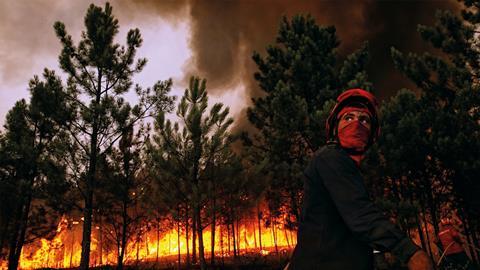Climate change activists believe strategic litigation is invaluable in pushing the issue up corporate and political agendas – even it fails. And this month, all eyes are on Strasbourg
A Montana judge’s ruling in a constitutional matter last month is likely to reverberate well beyond the straight-line borders of the north-west American state. By ruling in favour of a dozen youthful plaintiffs who argued that Montana’s continued development of fossil fuels violates the right to a ‘clean and healthy environment’, judge Kathy Seeley gave a major morale boost to the growing international trend of using strategic litigation to drive environmental concerns up corporate and government agendas.
Campaigners say litigation – even when unsuccessful – has a unique ability to focus minds on the issue. ‘Litigation makes the risk more tangible,’ Joana Setzer, assistant professor at the LSE’s Grantham Research Institute on Climate Change and the Environment, told journalists last week. ‘Nothing has been as effective as litigation in communicating science and responsibility.’
Climate litigation frequently involves novel choices of legal mechanism and jurisdiction. In one high-profile case, Luciano Lliuya v RWE AG, a Peruvian farmer, Saúl Luciano Lliuya, is suing German energy giant RWE for part of the costs of preventing a glacial lake from flooding his hometown in the Andes. The basis of the claim is an estimate that the German company – which denies liability – has been responsible for 0.47% of global carbon emissions since the Industrial Revolution. It is therefore liable for that proportion of the damage caused, the claimants assert: $20,000 in the Peruvian case.
Judges have often looked askance at such creative case-building. The risks for claimants, in England and Wales at least, were illustrated last month when the High Court ordered the UK-based international climate litigation group ClientEarth to meet the ‘substantial’ costs of its opponent in a failed attempt to hold directors of Shell personally responsible for alleged failures to manage climate change risks. The case was brought as a derivative action under the Companies Act; it was thrown out on the papers and again following an oral hearing. In his latest judgment, the Honourable Mr Justice Trower also ruled that grounds of appeal lodged by ClientEarth had no prospect of success.
One of several points in the novel action that failed to impress the judge was ClientEarth’s claim to be working in Shell’s own interests. The group directly owns 27 shares in Shell, the world’s second-largest oil company. While it claimed its action was backed by the holders of 12 million shares, the judge noted that, with a single exception, letters of support ‘all appear to be based on a detailed common template and do not disclose the number of shares they hold’. In any event, the judge said, 12 million is only a small proportion of the total shareholding constituency ‘and it is that constituency as a whole whose views should carry very considerable weight when determining how Shell can best manage the climate change risk’.
In questioning ClientEarth’s motives, the judge could also have looked at the organisation’s latest annual report, in which Laura Clarke, chief executive, freely admits to ‘using strategic litigation to hold public authorities and private sector actors accountable’.
Later this month, all eyes in the strategic litigation movement will be on Strasbourg, when the Grand Chamber of the European Court of Human Rights is scheduled to hear a case brought on behalf of six young people from Portugal. Duarte Agostinho and Ors v Portugal and 32 Ors will attempt to hold 33 national governments – the EU member states, Norway, Russia, Switzerland, Turkey and the UK – responsible for wildfires that have ravaged Portugal since 2017.
The 33 states are charged with breaches of Articles 2, 3 and 8 of the European Convention on Human Rights, as well as Article 14 (prohibition of discrimination) on the basis that younger generations are particularly affected global warming.
The claimants are seeking a legally binding decision that would force the 33 governments (perhaps theoretically, in the case of Russia) to take tougher measures against climate change.
In Montana, meanwhile, the July ruling would reverse a state law barring state agencies from considering planet-wide pollution when permitting fossil fuel projects. However, the state attorney general’s office has already announced an appeal to the Montana Supreme Court. The hearing was a ‘week-long taxpayer-funded publicity stunt’, the office said in a statement.
But publicity-stunting appears to be half the point of strategic climate litigation. Whether it is a worthwhile use of the court’s time is another matter.





































4 Readers' comments